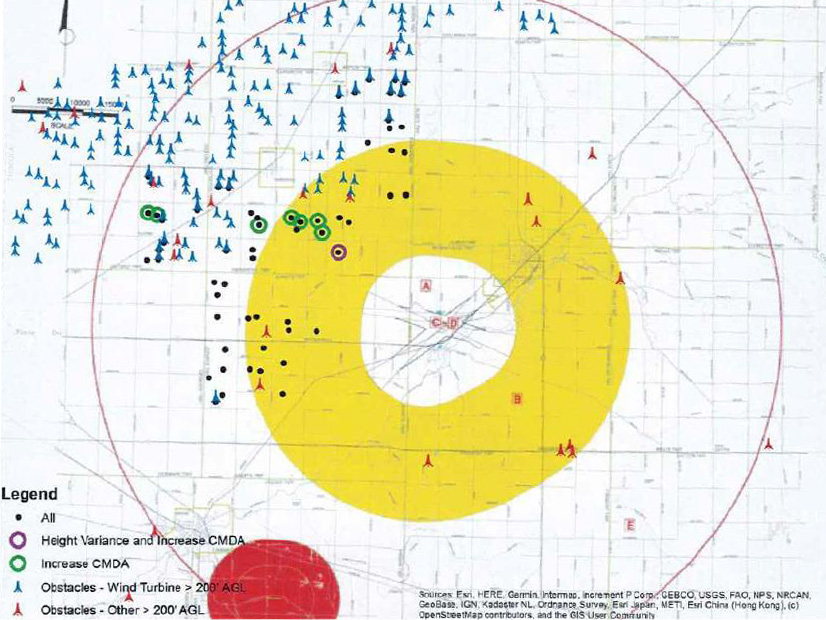
LANSING, Mich. — In a case that could have statewide implications, Michigan’s Court of Appeals ruled that a Tuscola County Airport board improperly denied variances for eight new wind turbines near the airport, the latest decision in a number of court actions involving the wind farm operated by NextEra Energy Resources’ (NYSE:NEE) Pegasus Wind.
Pegasus operates several wind farms in Michigan’s Thumb region, the location of the greatest concentration of wind farms in the state. Some local governments in the multicounty agricultural region have welcomed wind farms, but others have resisted vigorously. Pegasus’ efforts to locate a wind farm near Tuscola County’s airport have engendered more than a dozen legal cases in both state and federal court, said Heidi Stark, a member of the county’s Planning Commission.
In November 2019, the Tuscola Circuit Court reversed the Tuscola Area Airport Zoning Board of Appeals’ (AZBA) decision rejecting variances for 33 Pegasus turbines, which are now operating. A month before that decision, Pegasus submitted variance applications for eight additional turbines within the airport’s zoning area.
In this case, Pegasus Wind v. Tuscola County and Tuscola County Airport Zoning Board of Appeals (Docket No. 355715), the Tuscola County circuit judge ruled the AZBA had authority to deny the eight variances, although the Federal Aviation Administration and Michigan Department of Transportation (MDOT) had issued “determinations of no hazard.”
But Appeals Judge Michelle Rick, joined by Judge Douglas Shapiro, ruled that the circuit court erred in its ruling and the variances should be granted. Judge Christopher Murray dissented.
‘Practical Difficulty’ vs. ‘Unnecessary Hardship’
The Michigan Airport Zoning Act requires zoning boards of appeals to allow a variance “if a literal application or enforcement of the regulations would result in practical difficulty or unnecessary hardship and the relief granted would not be contrary to the public interest, but would do substantial justice and be in accordance with the spirit of the regulations.”
The Tuscola Area Airport Zoning Ordinance, in contrast, requires the AZBA to grant a variance if a petitioner establishes any one of those factors, as long as the FAA and MDOT’s Aeronautics Commission has found no hazard.
The court said that the circuit court improperly “conflated” the terms “practical difficulty” and “unnecessary hardship.”
It said many of the zoning cases cited by the circuit court and the parties on appeal did not differentiate between practical difficulty and unnecessary hardship because the prior zoning law allowed variances for both reasons.

That changed with the 2006 Michigan Zoning Enabling Act, which said only a showing of practical difficulty — and not unnecessary hardship — is required to justify the grant of “nonuse” variances, which are concerned with the area, height and setback requirements of structures.
“Because there appears to be confusion between the requirements of practical difficulty and unnecessary hardship, we use this case as an opportunity to distinguish those requirements in the application of variances,” the court said. “The law is clear that practical difficulty and unnecessary hardship are two separate things, and being unique to or inherent in the property is a requirement of hardships, not practical difficulty.
“The question is whether Pegasus has any use for this land under the current zoning — it does not — and whether entering into the agreements with knowledge that the land was subject to the zoning ordinance rendered these hardships self-created — also no,” the court continued. “Accordingly, none of the AZBA’s three stated reasons for concluding that Pegasus failed to establish a practical difficulty is supported by the record, let alone supported by substantial evidence, and the circuit court misapplied the practical difficulty standard.”
Public Interest
The court said the circuit court also erred by affirming the AZBA’s determination that the variances would be contrary to the public interest and protection of the airport’s approach.
The AZBA said the turbines would require a 300-foot increase in minimum descent altitude and that there was no evidence that the energy generated by the project is needed or would be used in the surrounding community.
The court said, however, that there are already numerous turbines “in and around the airport.”
“The record does not contain any evidence supporting a finding that the addition of these eight turbines would or could create risks and situations different from what is already happening as a result of the numerous wind turbines already built.”
While the case deals directly with Tuscola County, many local governments in Michigan have adopted zoning ordinances to effectively block development of wind and solar farms. The AZBA ordered the case published, which means the ruling must be followed in similar cases unless a higher court overturns it.
Pegasus could not be reached for comment. Lawyers for the county could not be reached for comment on whether it will appeal to the state Supreme Court. The Supreme Court refused to hear an earlier case involving Pegasus and Tuscola County.


